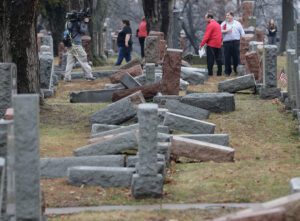
BALTIMORE – During the U.S. Conference of Catholic Bishops fall general assembly in November, Bishop Joseph C. Bambera was voted chairman-elect of the Committee on Ecumenical and Interreligious Affairs by his brother bishops.
Bishop Bambera was elected over Auxiliary Bishop Peter L. Smith of Portland, Oregon, in a vote of 128 to 111. He will begin his three-year term at the end of the 2023 fall general assembly.
While Bishop Bambera is currently a member of the committee, this will be his second time leading the group that assists the bishops in their commitment to advancing Christian unity and building ties of friendship and understanding with other religious traditions.
On Nov. 28, the committee recently made headlines by decrying rising antisemitism in the United States. Saying they are outraged by growing “antisemitic rhetoric” across the country, the members of the Committee on Ecumenical and Interreligious Affairs urged Christians to decry hate-filled statements and violence aimed at Jewish individuals, homes and institutions.
Committee members also denounced “any rhetoric which seeks to demonize or dehumanize the Jewish people or Judaism as a religious tradition,” in a statement. “In unequivocal terms, we condemn any and all violence directed at the Jewish people, whether motivated by religious, racial, or political grievances,” said the committee.
“The rising trend of antisemitic incidents has become even more painful in light of the church’s relationship to the Jewish tradition and our connections to the Jewish people in dialogue and friendship,” the committee said.
The Anti-Defamation League, which tracks incidents of antisemitism, reported 2,717 cases of harassment, vandalism and assault in 2021, an increase of 34% from a year earlier. The number of incidents is the highest on record since the group began tracking them in 1979.
Two rabbis involved in ecumenical dialogue with the committee praised the statement for the resilient solidarity it signifies to the Jewish community.
“The main emotion with the statement is gratitude,” said Rabbi Allyson Zacharoff, representative of the Reconstructionist Rabbinical Association in the National Council of Synagogues.
“Knowing that the bishops, that the church, is so willing to speak in such a strong way against antisemitism is incredibly fulfilling, incredibly gratifying,” Rabbi Zacharoff told Catholic News Service.
Rabbi Noam Marans, director of interreligious and intergroup relations at the American Jewish Committee, wrote in an email that the statement “reminds the Jewish community that we are not alone, that U.S. Catholic leadership understands resurgent antisemitism as a threat to Jews.”
He also said that antisemitism must be addressed by “all peoples, including, perhaps especially, the faith community.”
The bishops’ statement draws its inspiration from “Nostra Aetate” (“In Our Time”), the Second Vatican Council’s 1965 declaration on the relationship between the Catholic Church and non-Catholic faiths. It explains that over six decades the committee has built partnerships with the National Council of Synagogues, the Orthodox Union and the newly established Modern Orthodox group.
